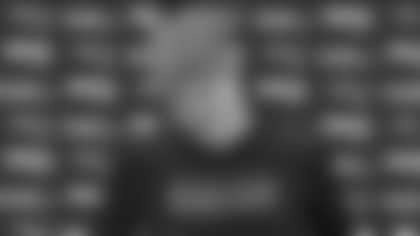BB: We've got the hardcore – that's me included, right? All right. That's another draft in the books. It was kind of a big day for us. We were pretty involved all the way through each round – either picking or moving or whatever in the round. So, doing a lot of activity. I feel like things got off to a good start with [Trey] Flowers; real productive player at Arkansas. [He] played mainly on the edge, a little bit inside. But a young player that I think has got a lot of good football in front of him; a lot of great qualities in terms of leadership, toughness, those kind of things. Then [we] took the two guards, probably pretty contrasting styles. Of course Tre' [Jackson] played in a pro-type offense with [Jameis] Winston, the quarterbacking and all the things he did at Florida State, whereas Shaq [Mason] played in an offense that was obviously very run-oriented and did a lot of run blocking. [He's a] aggressive, very athletic player. So, those are two guys that will come in and compete with us from different backgrounds that will have to learn our system and merge together. But Tre' played next to [Bryan] Stork for most of Bryan's career down there at Florida State, so they know each other well. Then we took Joe [Cardona], long snapper. That was obviously kind of a need pick based on our situation. Then [we] kept it going with Matt Wells, linebacker, fast linebacker or safety. He kind of played the Sam linebacker for Mississippi State. A lot of what he did was kind of defensive back related, particularly when they faced spread offenses and that kind of thing – [he's] somewhere between a linebacker and a safety, but runs very well. [He was a] productive player for them on defense and the kicking game; three-and-a-half year starter or whatever it was. [A.J.] Derby is a guy that's really only played the position – tight end – for a year. [He] was at Iowa, transferred, went to junior college, had a very productive year at quarterback there, whatever it was, 3,000 yards passing or something like that, went to Arkansas to compete at quarterback and was a one-year player at tight end, so I think he's got a lot of good football ahead of him. He's transitioning from kind of the linebacker-quarterback high school deal to quarterback to tight end. I think he's a tight end. He thinks he's a tight end. In the meantime, he's got a lot of playing experience, just not at the position that he'll be playing for us. Darryl Roberts, a multi-year starter down at Marshall. [He's] a guy that has good size, fast, played primarily on the perimeter down there. Good player though, very good role on the team in terms of leadership and so forth. Then Xzavier Dickson, a three-year starter at Alabama, real good program. [He's] done similar things to maybe we talked about [Geneo] Grissom a little bit yesterday. He's played a lot of outsider linebacker [and] defensive end, and in the kicking game. Obviously been in a good program, been well coached. He's played against a lot of good people and he's done well at Alabama. [We'll] put all those guys into the mix and try to start getting them oriented this weekend and see how it all shakes out from there. That gave us a pretty full roster. We'll sign probably somewhere in the neighborhood of half a dozen or so free agent. We'll see how that all turns out. [Director of player personnel] Nick [Caserio] and his staff are working and finishing up on that. We'll get the exact number here whenever all that comes together, it might be a day or so. But that kind of completes the initial part of our roster here. We'll keep working through the team-building process, as we always do. [We] saw several players come on to our roster halfway through the season or thereabouts last year. There's a long way to go on that. I think this is just a step, a significant step in the process, but certainly not the final one. We'll take what we have and work with it and move forward and if we can upgrade it or improve it or change it along the way as we see necessary along the way, then we'll look at those options. I just don't think in any way this is a final roster. It's not even close to it. That's it for me.
Q: There was also the trade you made with the Packers. What was the thinking to move down 19 spots there? What did you like about that?
BB: That we added an extra player. So, it would have been [Roberts].
Q: Was that so you wouldn't have to compete to sign him as an undrafted free agent? Was that the thought process?
BB: Well, that's why we took Joe Cardona.
Q: But the extra pick was toward the end of the draft. There's still value in being able to draft a guy.
BB: Yeah, sure. Yeah, absolutely. But we felt like we would be able to – we took Joe at 147 or traded down to [166], I forget the numbers, but whatever it was, we felt like we would be able to draft him at a later number in the fifth round and just add another player. You never know how that pick is going to turn out. Maybe you draft somebody, maybe you trade it, maybe you use it to move up somewhere else [if] you see somebody. You know, when you're moving back to 247, you're not doing it because there's a guy there that you can't live without. If you feel that way about, then you take him earlier than that. It just gives you added currency to either select the player, or use it in some other way.
Q: What do you know about Joe Cardona's availability?
BB: We'll work through the process. There are some things that are out of our control, but whatever it is, we'll work with it. It's not the first time we've had a guy from a service academy and went through some version of this process. So we'll see how it goes.
Q: You mentioned he was a need pick. If he has a commitment to fulfill, then the need will still be open.
BB: Well, [if] the player got hurt. That's football. We'll see how it goes. If he can't play this year, then he plays next year. If he can't play that year, then he'll play the year after. He's a good player. [We] felt like he was the best long snapper in the draft. So, we have his rights. Whenever he plays hopefully he'll be able to contribute and play well. Whenever that is, we'll see. I don't know.
Q: It strikes me that a lot of the players you took can do multiple things and you'll find out how they look when they get here. It's not like they have predetermined things they'll do. Has it always been that way?
BB: Yeah, I think you always bring them in and see what they do. We haven't had them in this program. It's a different level of competition. It's a different structure than any of them have been in before. We'll see how they react to it and how they perform in our system relative to some other ones.
Q: I should say it's more ambiguous with some of the guys where they'll play. You don't know if Shaq will play center or guard. It's not like you know where they'll play.
BB: I think the players that we take we have an idea of what we think they'll do for our team. Each guy has a specific, 'Here's what we think he'll do.' Now, what he actually does or not, we can't forecast that with 100 percent accuracy. But I'd say that's the way it is with everybody. Draft anybody you want, but until you actually get them into your system and start working with them and see how their skills transfer to what you're doing, I don't think you really know until you actually start doing it. Even if the guy has played in the league for 10 years, I don't know that you know that. We brought Randy Moss in here, I didn't know what it was like working with Randy Moss until we worked with Randy Moss. He had some great skills. He had some things that we're different maybe than what – we just didn't know. I don't think – we have a plan what we think they are, but we'll see how it turns out. I don't know.
Q: Going into the draft, did you think the edge rusher spot was deep in this draft?
BB: I'd say there were a number of players at that position or had those kind of skills. But I think that the players that we took that would fall into that category also bring other things to the table, whether it's the ability to play off the line or the ability to be a rusher not off the edge, or at least they've done it. Again, we'll see how they do. I don't know how it will turn out, but at least they've done some of those things: either rushed inside, played off the ball, played in coverage. I don't think it's just one thing.
Q: Do you like the versatility that you've added?
BB: Again, I don't know. Look, there's a lot to be said for being able to do something really well. I'm not against that in any way. Maybe some of the guys that have done several things do one thing great and that's what their role is. That's great too, but we'll see.
Q: You mentioned Joe Cardona was a need pick. Obviously there's a Navy connection. I'm just wondering how much that helps his profile in the eyes of the team. You said he was the best long snapper in the combine.
BB: Look, I'm not trying to evaluate the rest of the draft. He was the only guy that went to the combine, so if that's a measure – which I'm not saying it is –
Q: How much did where he went to school help him as opposed to if he was at another school?
BB: Joe Judge worked out – we evaluate all the players that we think can help us at every position: snappers, punters, kickers, every other position. If we think a guy can come in and help us and play for us, then we're interested in him. It doesn't make any difference where he's from. We've drafted snappers before, we've drafted punters before, we've drafted kickers before. I've drafted all those positions. If you feel like the player is worthy of it, then – it's not like you can have depth at those positions. You can't have three snappers. Somebody has to have that job. If you feel like the guy can do it and you the take him then hopefully he'll be able to do it.
Q: We saw Dante Scarnecchia pop up at a bunch of pro days this spring. What kind of impact did he have in the pre-draft evaluation process and this weekend?
BB: Given the way our season went this year, the length of it and the offseason schedule and so forth, he was able to help us out and go do a few things for us in the draft process that were very helpful. He did a great job. He obviously has a lot of experience with our system, a lot of experience with players that are on our roster for comparison sake, players that we've drafted or evaluated in the past. So we kind of asked him to help us out in a situation where we were kind of, I'd say a little bit from a personnel standpoint, a little bit behind the curve there. He was available and he did a great job.
Q: When you're scouting or evaluating players, is part of the process envisioning what role they'll have on special teams?
BB: It's envisioning what role they have on your team in every sense of the word role. How they would play on offense, defense, special teams, kind of how they would fit on to your team, how they would fit in the weight room, in the meeting room, in every place they are, what they need. I'd say every player needs something – usually a lot more than one thing – and whether or not you feel like as an organization you can give that player what he needs, whether that's scheme or a certain type of training or whatever it is. So, yeah, all that is a part of it. Just trying to figure all that out: how he fits with you in small areas, very specific areas, and then in relation to the big picture. When you have a team, you have to manage all the aspects of your team. There's the financial aspect and the salary cap we have to manage, an age [aspect] and there's a transitional aspect to our team. I mean, there's going to be turnover; that's the business we're in. Understanding where that turnover could occur, it's all part of the management. So yeah, everything. We try to – I'm not saying we do a great job of it or do it perfect or anything, but we definitely take it into consideration, talk about it and try to do the best we can with it. Sometimes you can have control over it; sometimes you have to give something up to get something else. Maybe it solves one or two problems, but leaves something else that's maybe not quite the way you want it but it's the best you can do.
Q: A.J. Derby mentioned his dad was in camp with you.
BB: That shows you how old I am. That's a sad commentary. Yeah, we talked about that when he came in.
Q: Do you remember his dad?
BB: You know, he wasn't there a long time.
Q: At Florida State, it was a lot of Tre' Jackson at right guard. Was there anything with him playing the left side and is that a different transition? I know you've talked in the past about right tackle-left tackle; some guys can do it and some guys can't. Matt Light was a guy that was more comfortable at left. Have you seen Tre' play left guard and is that a different transition?
BB: Not much. If I have, it hasn't been much. I think even in the Senior Bowl he played right guard. Yeah, I think I'm [remembering] him at right guard. It's got to be in the high 90 percent at right guard. That's always an interesting question. Some players – we've talked about this before –some players, right side, left side, it doesn't even matter. The next guy – right side, left side, and he feels his footwork is backwards or the odd-even numbering or the wording, whatever it is, and they are a lot better at one spot than trying to flip back and forth. I've coached hundreds of players and some guys it's seamless and other guys it's monumental and there's some in between, so we'll just have to see. But he's played that one spot for a long time, so I think until he actually did it, I don't even know if he could answer that question. But there's certainly a different stance, different footwork – you're just seeing the game a little bit differently. But that's tackles, guards – you know, I think tackle is a little bit different because of the type of player that plays on the offensive left compared to the offensive right. Not that you don't eventually see them all, but there's kind of a difference there. But inside it's more consistent, but again, the footwork is different. Yeah, we'll have to see. Same thing with Mason too, though – they both played right guard. He played right guard at Georgia Tech.
Q: He was just right guard?
BB: Yeah. Well, at least the last couple years. Maybe back in '11 or whatever, but I mean he's basically played that side too.
Q: How difficult is it for a guy like Shaq who comes from a system that's not exactly a pro-style in college? Is it tough to project how he will be able to perform?
BB: I think every player is going to have a big adjustment. The thing I'll say about Shaq is just watching him at the Senior Bowl, I mean it was only one week, but he made a huge improvement just in those, whatever it was four or five practices, whatever it was down there. His stance is different. You could see each day progressively how he was taking to the coaching down there and his footwork and his hand placement and his body position. I know it was basic. It wasn't like it was a big scheme thing at the Senior Bowl, but just doing things on a daily basis better than the day before, looking more comfortable doing them. And it was different than what they did at Georgia Tech. Just relative to Tre', I would say it probably wasn't as big of an adjustment for him. With Shaq it was. But I thought in a few days he showed tremendous technique progress in that. But I mean look, Steve Neal, talk about adjustment. The guy went from not even knowing where the field was to starting at guard in a year and a half. It's not that kind of adjustment. And this guy is a football player and from a run blocking standpoint, I'd say he's probably ahead of every other player in the draft. Unless there was another one from Georgia Southern or Georgia Tech or whatever, but this guy ran blocked in one game more than some teams did all season. So I'd say he's ahead in the run blocking, behind in the pass blocking. There may be other players that are in a two-point stance pass-block 50 times a game that in all honestly don't run block very well. He's kind of the flip of that which is a little bit unusual but it is what it is.
Q: What's the next biggest challenge for all of these players?
BB: The biggest challenge for all these players is to get on our program. For the last six months, they've been a man without a country. They have no team, they have their own individual, whatever it is, situation, and they're trying to figure out, 'How do I best get ready for the NFL?' And that is all 32 teams or however many it is showing interest in them and trying to figure out, 'How do I prepare for that?' Each guy has been an independent contractor; they've been on their own whatever it is: their own trainer, their own training system, their agent, whatever they've been doing. And right now, that's all changed and they can forget about all that and they need to become New England Patriots. That's what we're going to start getting to work on. They've got to get out of that mentality of 'I'll get up when I feel like it. I'll go to work when I feel like it. I'll eat where [I feel like it]. All that. I'll train the way I want to train.' They're done with that. That will be a huge adjustment for them. I don't care where they came from, I don't care what position they play. None of that makes any difference. They haven't been doing it and they're going to start doing it and they're going to start doing a lot of it. They're going to be doing it for day after day after day for a long time going forward – if they can, if they're successful. That will be a big adjustment for them. It will be a big adjustment for every rookie because none of them have been doing that. Welcome to the NFL. That will start Thursday. They'll get a big dose of New England Patriots football over the next whatever we've got, six weeks – however long it is. We'll give them everything we can in heavy doses, try to get them ready for training camp and they'll get even more then. The strong will survive. The other ones will fall off. And we'll keep going.
Q: The train doesn't stop.
BB: Sure doesn't. Sure doesn't. We've got 31 other teams competing just as hard as we are to do the same things. Yeah, we're going to have to outwork people, out-hustle them and just do a better job. That's what our business is. Beats working though.
Q: You going to watch this fight tonight?
BB: No, probably not. Let me know how it comes out.







































